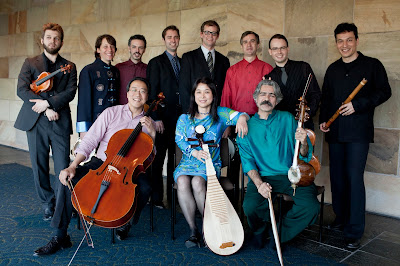Yo-Yo Ma sees the United States as the ideal arena for what the Silk Road Ensemble represents
 |
| Yo-Yo Ma (seated, left) with the diverse group of musicians known as the Silk Road Ensemble. |
That's why the 62-year-old musician, born to Chinese parents in Paris and an American since childhood, describes the kind of concert a Hilbert Circle Theatre audience will hear Monday evening as American to the core. The Indianapolis Symphony Orchestra is presenting the 16 musicians for one performance only. (Without Ma, 10 members of the Silk Road Ensemble appeared at the Carmel Palladium last February.)
"I think what's interesting is that in the United States," Ma noted, "we make up 5 percent of the world's population and actually contain all the world's population groups."
Speaking by cellphone on his way to an airport on the Ensemble's current summer tour, Ma explained: "If we know our own citizenry, and our citizenry knows itself, having all the ethnicities within our borders means we automatically have access to everyone in the world."
In the present political climate, however, that access may be blocked. Yet the optimistic Ma won't accept that the United States is fated to become less receptive to the rest of the world — if fear can be kept in check. "We become the strongest, the most empathetic, space because creativity comes from the edges, from the margins between different people," he said. "That's when you have the most new life. It's our talent as a nation — our ability to innovate — and that puts us right up there, if we use those assets. Fear is very dangerous. If you're afraid, you clam up and become smaller."
Looking more closely at how the Silk Road Ensemble operates, Ma said simply: "We are a band with similar values. Some of the values are virtuosity and generosity: They are masters of what they do, and they're generous in what they're sharing. We play music from anywhere in the world, and we have a lot of internal leaders."
Curiosity is an important ingredient of the musicianship the ensemble requires. Each member has to be a quick study, since they are learning pieces, sometimes new genres, that their colleagues bring to the group, and rehearsal time is at a premium. "Because everybody's curious and flexible, a lot gets done in a short time," Ma said. Then he added an important element that may explain why the Silk Road Ensemble works: "We won't let anybody fail. Everybody will be able to make their idea successful. They can experiment and take risks."
About seven or eight musicians, Ma estimates, have been with the group since the beginning, so there is lots of continuity. Given considerable "save the date" advance notice in planning annual tours, the musicians are free to meet obligations elsewhere in the musical world. Violinist Colin Jacobsen leads a chamber orchestra, the Knights, and plays in an important string quartet, Brooklyn Rider.
When the collective input filters into a Silk Road Ensemble program, the group has met the objective Ma had in mind when he first convened it near the end of the last century. How it works can be appreciated in a documentary film released last spring, "The Music of Strangers," and its companion CD, "Sing Me Home."
The public effect goes beyond music, he made clear: "The best way to conquer fear is building bridges of understanding — between disciplines, between people — because then we can shed light upon all those problems." When the audience has a good time as a result, there's a further benefit, Ma added. "There's the joy of community. That's always been a good thing, because now we're getting worried that we are losing the ability to manage our own world. What we want to do is give people the opportunity."



Comments
Post a Comment